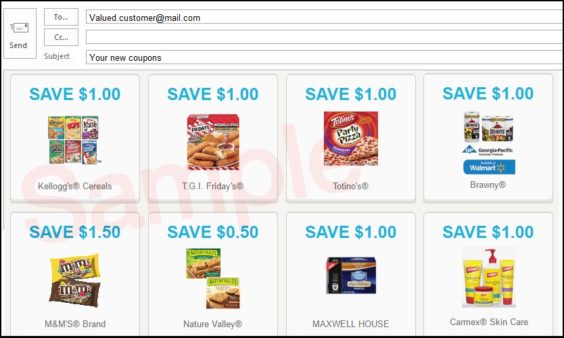Have you ever opened an email that promises a coupon inside, only to click on the link and find an expired coupon or a dead deal? If you don’t watch your email like a hawk, and print a coupon offer the moment it lands in your inbox, you might miss out – and might not bother opening similar emails the next time.
So Coupons.com is working to change that. It wants to ensure that whenever it sends you an email with coupons inside, those coupons will be good to go.
The process is described in a newly-published patent application by Coupons.com parent company Quotient Technology. “Transmitting Valid Coupon Offers to an Email Recipient” details a system in which “dynamic coupon offers” are emailed to potential users. Actual links to the coupons won’t actually be sent as part of the email itself. Instead, the email will include an “empty container” that will be filled with coupons that are valid at the precise moment you open it.
The “dynamic content provider” that the company is seeking to patent, “determines in real time a set of valid coupon offers for the user and transmits the set to the user in real-time for insertion into the empty container.”
Coupons.com already sends out a weekly “SuperSaver” email to subscribers, which features highlights from the website’s selection of coupons that week. Brands can also use Quotient’s services to email you offers for their own products. But what if you open the email a day, a week or longer after receiving it? You might be disappointed that the coupons inside aren’t any good anymore.
So the new system would ensure that coupons are inserted “at a time when the recipient opens the email… In this manner, only currently valid coupon offers are provided to the recipient.”
Does that mean you can save a single email, and just keep opening it to get the latest coupons? Possibly. The system can detect when you open the email for the first time. Within a specified date range, if you open the email again, the system will access a cached version of the coupons that were originally offered to you, and offer them to you again. After a certain amount of time, however, if “the user has opened the email message at a second time subsequent to the first time,” then the system will produce “a second set of valid coupon offers for the user, and transmitting in real-time, the second set of valid coupon offers to the user for insertion into the email message.”
The idea, Quotient explains, benefits both brands and couponers. “In the sales and marketing industries, the ability to send e-mail messages about offers for goods and services such as coupons can greatly enhance the chances that the recipient will read the e-mail messages, and also enhances the chances that the individual will purchase the goods and services being advertised in the e-mail messages,” the patent application reads. “If the offers included in the e-mail messages are expired or invalid, the recipient may become frustrated, and may even ignore future e-mail messages from the same company.”
The coupons in the emails you receive can be printable, or load-to-card digital offers. And they can be customized, based on “the user’s address, location, demographic information, user preference information, loyalty account information, and so on.” The patent application goes on to describe various potential ways of uniquely identifying coupon recipients, such as individualized account numbers, device identifiers, or “biometric data” such as “a fingerprint or a retinal scan.”
Well, that just took a turn toward the creepy. So now they want to fingerprint you or scan your eyeball before emailing you a coupon?
Coupon providers are always looking for ways to make their coupons more secure, and that’s certainly one way to do it. Call it the price of progress. But if you’re not willing to hand over such personal information to companies that want to sell you stuff – you just might decide that dead coupon links in your emails aren’t so bad after all.















Patent law has become ridiculous. Coupons.com wants to patent what essentially amounts to displaying a website within an email. Seriously??